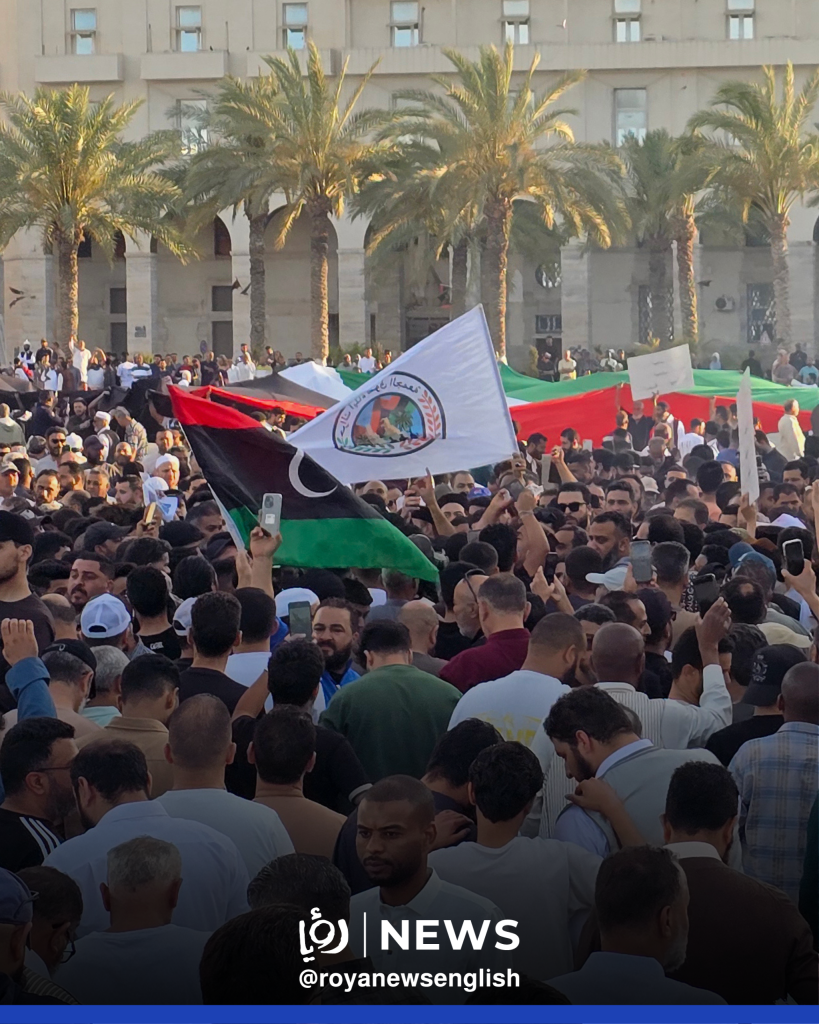Libyan protesters burn a portrait of Prime Minister of Libya's Tripoli-based Government on May 16, 2025.
Photos: Libya faces escalating crisis as protests, resignations, and violence engulf Tripoli
Libya is experiencing a significant escalation in political and security tensions, with widespread protests demanding the resignation of Prime Minister Abdulhamid Dbeibah, the resignation of three cabinet ministers, and ongoing militia clashes in Tripoli.
The unrest, intensifying in May 2025, follows the assassination of a militia leader and centers on demands for delayed national elections.


Protests demand Dbeibah’s resignation:
On May 16, 2025, hundreds of protesters gathered in Tripoli’s Martyrs’ Square, calling for the resignation of Prime Minister Abdulhamid Dbeibah and his Government of National Unity (GNU). Demonstrators chanted “The nation wants to topple the government” and “We want elections” and marched to Dbeibah’s office, displaying images of Dbeibah, his national security adviser Ibrahim Dbeibah, and Interior Minister Emad Tarbulsi with red crosses.
The protests turned violent when some demonstrators attempted to storm Dbeibah’s office.
A government statement reported that a police officer was killed by “unknown attackers” who shot him, and attempts were made to set the office on fire with Molotov cocktails. Security forces were deployed to the scene.
Three ministers resign:
On May 16, 2025, Economy and Trade Minister Mohamed al-Hawij, Local Government Minister Badr Eddin al-Tumi, and Housing Minister Abu Bakr al-Ghawi resigned, citing support for the protesters’ demands. Local media and a video released by two of the ministers confirmed the resignations, despite initial government denials.
Militia clashes follow assassination:
The unrest was triggered by the assassination of militia leader Abdelghani al-Kikli, known as Ghaniwa, on May 12, 2025, at a military base in Tripoli’s Abu Salim district.
Al-Kikli led the Stability and Support Apparatus (SSA), controlling key institutions. His death led to clashes between rival groups, including the 444 Brigade and the Radaa force, resulting in at least eight civilian deaths.
On May 13, 2025, Dbeibah ordered a military operation to dismantle “irregular” armed groups. Clashes continued in western Tripoli, with skirmishes as of May 14, 2025, despite a government-announced ceasefire.
Regional, international reactions:
In Misrata, counter-protests supporting Dbeibah were reported on May 16, 2025. In eastern Libya, controlled by Khalifa Haftar’s Libyan National Army, military movements were noted, but no direct involvement in Tripoli’s unrest was confirmed.
The United Nations Support Mission in Libya (UNSMIL) issued a statement on May 16, 2025, affirming the right to peaceful protest and urging all parties to protect civilians. Egypt’s Foreign Ministry advised its citizens in Libya to stay indoors and avoid conflict zones.
Economic, operational status:
The National Oil Corporation (NOC) reported on May 16, 2025, that oil and gas operations in southern and eastern Libya remained unaffected. Tripoli’s Mitiga airport and local markets resumed operations on May 16 after earlier closures due to the violence
Background
Libya has been divided since the 2011 overthrow of Muammar Gaddafi, with rival governments in the west (GNU, led by Dbeibah) and east (backed by Haftar). The GNU, formed in 2021 under a UN-backed process, was tasked with holding elections by December 2021, but disputes over electoral rules postponed the vote, extending Dbeibah’s tenure.




